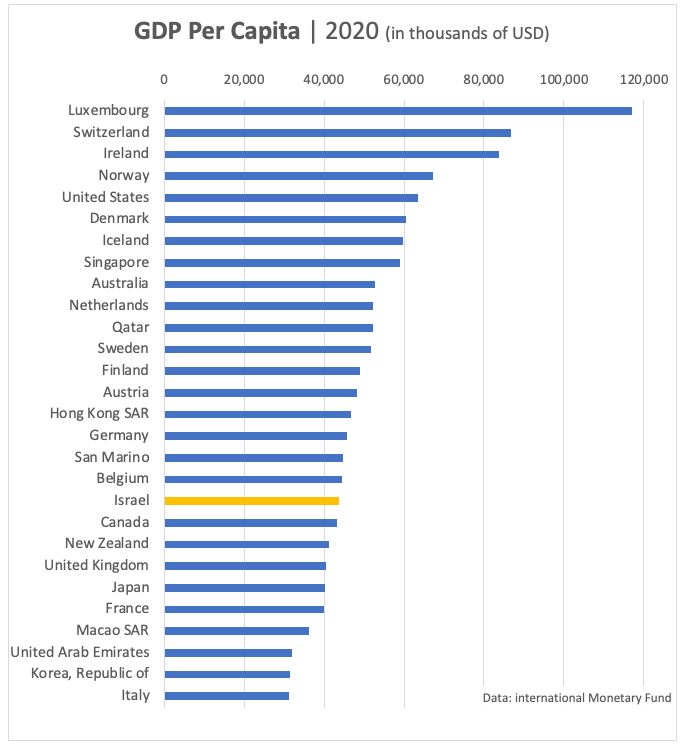The year 2020 — the year of the coronavirus pandemic — was an unusual year by any measure. In terms of GDP and growth, it was the worst year for the Israeli economy in its 73 years of economic independence. According to the Israel Central Bureau of Statistics, in 2020, the gross domestic product contracted at real rate of 2.6% as compared to 2019.
Despite this, however, the past year actually underscored the resilience of the Israeli economy as compared to other leading economies, which experienced the effects of the economic crisis much more severely. While the Israeli economy contracted at a relatively moderate rate, primarily due to the increased scope of exports from the high-tech sector, the US economy shrunk at a rate of 3.5%, while Germany and Japan contracted 5% each. Meanwhile France saw an 8% fall, Italy shrunk 9%, the UK by 10%, and Spain with the sharp contraction of around 11%.

In light of this, Israel finds itself in the enviable club of the top 20 economies in the world with the per capita GDP at $43.7 thousand (USD) for the past year, putting Israel in the 19th spot on the list, according to data from the International Monetary Fund.
GDP per capita growth data — an economic indicator of a nation’s level of wealth — actually emphasizes the impressive progress that Israel’s economy has made in this complicated past year, and it’s leapfrogging to the list of the richest nations in the world.
In that respect, Israel’s wealth, as of now, stands close to 44 thousand dollars per citizen, which is higher than some of the most advanced and most-developed economies such as the UK (40.4 thousand dollars per person), Japan (40.1 thousand dollars per person), France (39.9 thousand dollars per person), South Korea (31.5 thousand dollars per person), Italy (31.3 thousand dollars per person), or Spain (27.1 thousand dollars per person).
Closing the gap
The United States is still placed higher than Israel on the list, with a GDP of 63.4 thousand USD per person. However, the gap between the two economies has clearly narrowed in the last decade, such that today this rate stands at around 70%, a much better figure than that shown by many developed economies. For instance,the per capita GDP in South Korea and in Italy is less than half of the American figure (49.7% and 49.3% respectively), while Spainstands at just 42.8% of the American GDP.

And that’s not the only impressive figure. In 2019, Israel ranked in the 21st spot, in terms of the GDP per capita, while a decade ago it was not even included among the top 30 leading economies. As mentioned, this past year was the first in which Israel made it into the top 20 club of the richest economies, and in doing so made particularly impressive progress from 32nd place, where it ranked in 2010.
But apart from the encouraging figures, how is it possible that we aren’t feeling particularly wealthy? The issue of the cost of living in Israel has not been solved in recent years and has, in fact, only worsened — to the point that Israel is still considered one of the most expensive countries in the world.
According to the OECD organization, the prices in Israel today are about 25% higher than their average from all of the other countries in the organization. So while in terms of income per person Israel is in 19th place, which is very respectable — in terms of purchasing power parity (PPP), an indicator that compares different countries through a “basket of goods”, Israel only comes in at the 35th place.
Despite this, thanks to an accelerated growth rate, Israel has also managed to register improvement on this front, which can be seen in a move of two places compared to last year, then ranked 37th, and 7 places in the list of world economies ranking from 2010, when it was ranked 42nd.




